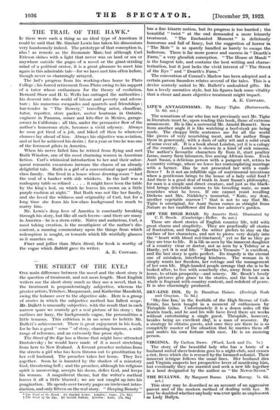THE STREET OF THE EYE.t
ONE main difference between the novel and the short story is the question of treatment, and not mere.length. Most English writers use the short story much as they use a. novel, that is, the treatment is preponderatingly subjective, whereas the greater artists, Tchehov, Maupassant, and Katherine Mansfield, swing the balance over to the objective side. Here is a group of stories in which the subjective method has fullest scope. Mr. Bullett is unusually subjective, with the result that in each narrow space we scarcely get a real picture of his story ; the outlines are hazy, the backgrounds vague, the personalities a little tenuous. This criticism is in no sense to belittle Mr. Bullett's achievement.. There is great enjoyment in his book, for he has a good " sense " of story, charming humour, a wide range of reference, and an extremely fine prose style.
The Street of the Eye has a theme that might have attracted Dostoievsky ; he would have made of it a novel stretching from here to New Zealand. A fervent preacher reclaims from the streets a girl who has been thrown out to prostitution by her evil husband. The preacher takes her home. They live together. Soon he is haunted by the shadow of a minatory God, threatening hell ; and the preacher, although his religious spirit is unswerving, accepts his doom, defies God, and keeps his woman. A magnificent theme, but the writer's method leaves it all a little blurred ; we are not caught up into his imagination. He spends over twenty pages on irrelevant intro- duction, and only fifteen on the real story. " Sleeping Beauty" • The Trail of the Hawk. By Sinclair Lewis. London ; Cape. [7a. 6d.I t The Strea of the Lie. BY Cleraid Bullett. London: Laue. IA 614 has a fine bizarre notion, but its progress is too hurried ; the beautiful " twist " at the end demanded a more leisurely treatment. " The Enchanted Moment " is deliciously humorous and full of fancy, but the suggestion of horror in " The Mole " is so sparely handled as barely to escape the ludicrous. There is far more power and success in " Dearth's Farm," a very ghoulish conception. " The House at Maadi " is the longest tale, and contains the best writing and charac- terization, but it just lacks the vivid interest of " The Street of the Eye" and " Dearth's Farm."
The convention of Conrad's Marlow has been adopted and a certain parson Saunders relates several of the tales. This is a device scarcely suited to Mr. Bullett's undoubted gifts. He has a lovely narrative style, but his figures lack some vitality that a closer and more objective treatment might impart.
A. E. COPPARD.


































 Previous page
Previous page